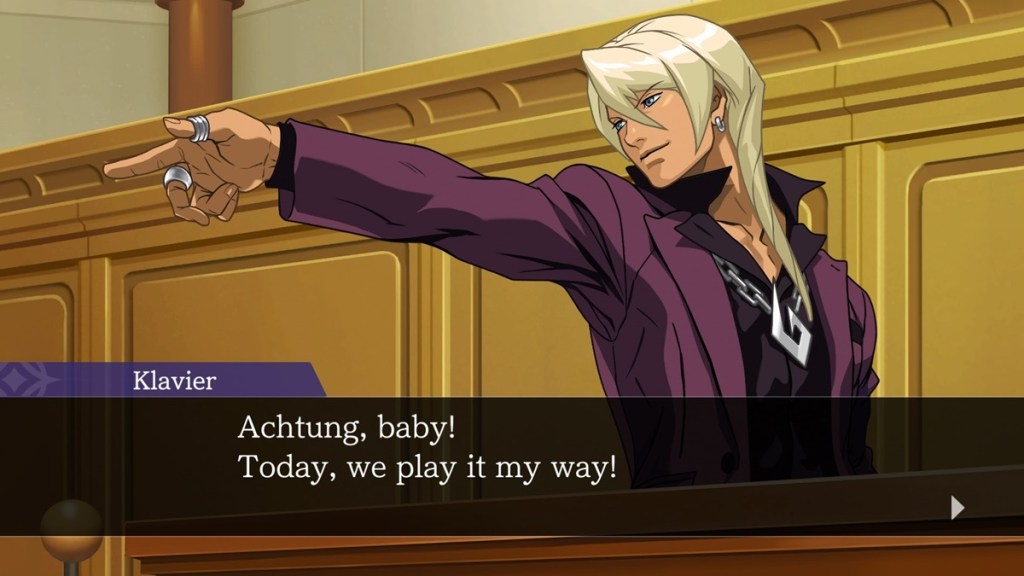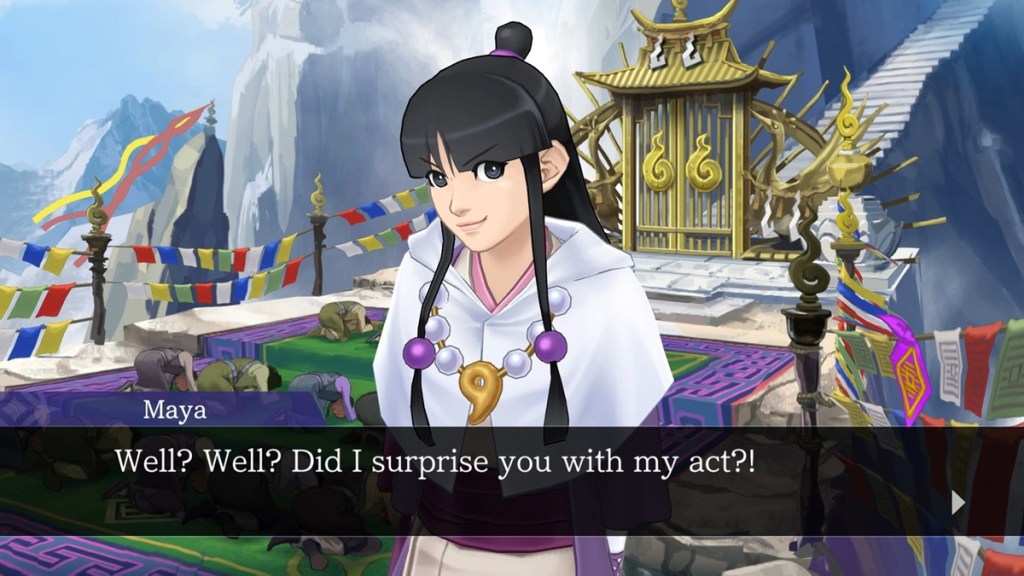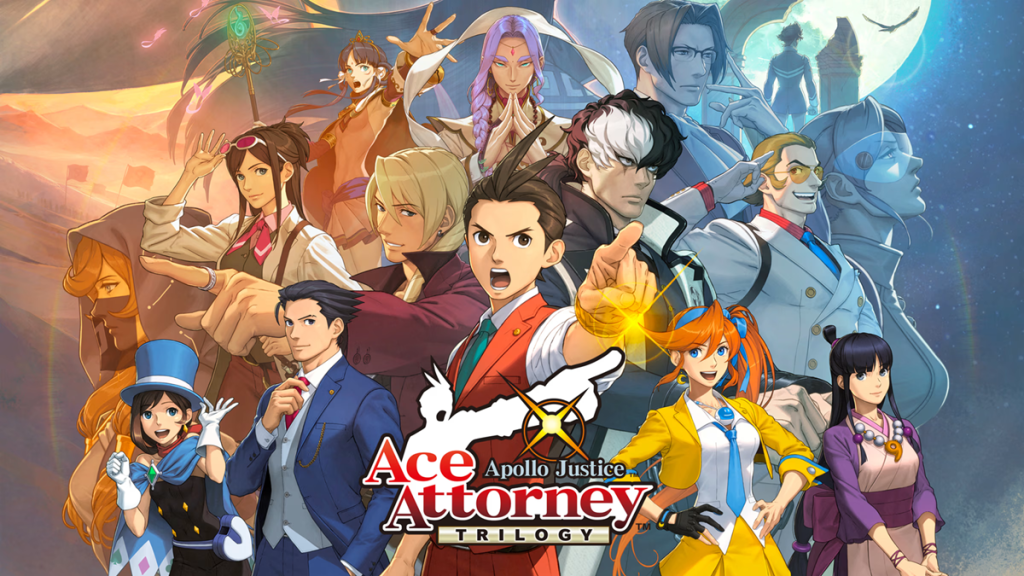For fans of Capcom’s long-running Ace Attorney series, the last few years have been rather hit or miss. On the one hand, a collection of the first three games in the series was finally ported to modern platforms (freeing them from the shackles of mobile and handheld devices), and the two Great Ace Attorney games (which were previously Japan-exclusive) were localized and released for western audiences. On the other hand, it’s been close to a decade since we’ve seen a brand-new release in the mainline series, with Capcom going radio silent about the possibility of a seventh game.
In what we can only hope is a peace offering to tide us over, the fourth, fifth, and sixth entries have been given a fresh coat of paint and bundled together in the oddly-named Apollo Justice: Ace Attorney Trilogy (more on the weird choice of name in a minute). For anyone who played the first Ace Attorney Trilogy, you’ll more or less know what to expect here: higher-res graphics, modernized UI, and a slew of quality-of-life features.
Aside from being able to jump into any game, episode, or chapter (intended play order be damned), players who only want to experience the story can turn on Story Mode, which lets you take it easy while the game plays itself for you by solving puzzles, interrogating witnesses, and collecting evidence. For those who don’t have a penchant for jamming on the X button for hours on end, you can also choose to have the game advance the dialogue for you, with a conversation log available should you want to re-read lines that you glossed over initially. Granted, these inclusions are far from revolutionary, but they are certainly leaps and bounds ahead of what was available on the original DS and 3DS versions.

While Apollo Justice appears front and center on this trilogy’s box art and name, only one of the three included titles features him as the main protagonist. Having originally released back in 2008 for the Nintendo DS, Apollo Justice: Ace Attorney has more in common with the original trilogy compared to the two games that came after it. Granted, every mainline entry is split up between investigative phases and court trials, but Apollo Justice’s debut was, and still is, a 2D affair, save for a few sections where you examine evidence in 3D.
As you’d expect, the original artwork and sprites have been remastered for high-definition displays, and while I’ll always miss the pixelated look of the original, it’s hard to deny how slick this one looks when blown up on a big screen with proper support for 16:9 aspect ratios. It goes without saying; even fifteen years after its original debut, Apollo Justice: Ace Attorney still impresses. Unlike its predecessors, this one throws you right into the deep end with its tutorial case, weaving together several unanswered questions that are slowly unraveled throughout the subsequent three episodes. Apollo’s ability to “perceive” when witnesses are lying makes for interesting moments, with a suspect’s nervous twitch or tick often tying directly into their testimony. And of course, this game introduced us to the iconic Papa Phoenix. What’s not to love?

The other two games in this trilogy — Dual Destinies and Spirit of Justice — bring about some of the biggest changes the series has seen. For starters, the pair are the first games to feature fully-rendered 3D environments and characters, eschewing the tried-and-true sprites and fixed camera angles for a more dynamic, modern look. Having originally launched on the 3DS, this shift in visual style was met with mixed reception. The most diehard purists will likely not be swayed by these remasters, but the move to more powerful hardware lets Capcom’s artwork and animations truly shine. If you were ever put off by Dual Destinies and Spirit of Justice’s low-res presentation on the 3DS, the Apollo Justice trilogy might just sway your opinion with the bump in resolution.
Speaking of Apollo Justice, while he certainly plays a key role across all three of these games, he takes a bit more of a backseat in Dual Destinies and Spirit of Justice. Not only does Phoenix Wright return as a playable character, but newcomer Athena Cykes has joined the legal team. Where Phoenix and Apollo used their mystical magatama and bracelet to deduce when someone is being less than truthful, Athena makes use of an AI companion and a program dubbed the “Mood Matrix,” letting her pick up on subtle emotional cues and finding discrepancies between what a witness’ testimony and their emotional state. It’s a welcome addition (and thankfully, one that isn’t overused) that adds a new layer to the franchise’s tried-and-true trial and interrogation mechanics.
Spirit of Justice also makes use of each of the protagonist’s special abilities, while also throwing another wrinkle into the mix — Divination Séances. The original trio of Ace Attorney games had several plotlines centered around spirit mediums and communicating with the dead, but Spirit of Justice fully embraces this idea with Divination Séances, which lets you see the final moments through the eyes of the murder victim. If all of this sounds a bit off the wall, that’s because it is, though the devs do try to make it all sound plausible. While previous games in the franchise featured an interesting hodgepodge of Japanese culture thrown into an American setting, Spirit of Justice takes place abroad in the Kingdom of Khura’in, which itself is heavily inspired by the Eastern Himalayas. It took well over a decade, but Spirit of Justice does go out of its way to at least justify the series’ (sometimes) bizarre mix of criminal justice and spirit channeling.

Even though I’ve played every game in the Ace Attorney series (many of them more than once), it’s hard not to be enamored with what the Apollo Justice trilogy offers. Being able to relive the trials and tribulations (pun intended)of Phoenix and company without the friction of having to dig out aging handheld systems or emulate on PC is a godsend, and the numerous quality-of-life additions and bonus pack-ins are icing on top of the cake — along with a bevy of art assets and soundtracks to look over and listen too, all of the DLC costumes and episodes from the 3DS games are included, alongside an animation studio where you can throw together your own vignettes using character models, animations, in-game music, and voice lines.
If there’s one criticism I think will be levied against this new collection of games, it’s that, at the end of the day, it’s simply more of the same. Series diehards and more casual fans will undoubtedly find a lot to like here, and I certainly hope it’s a sign that we’ll be seeing much more of the Ace Attorney franchise in the coming years. For those who weren’t sold on the original trio of Phoenix Wright games, this second collection won’t do much to sway your opinion.
-
More of what you loved about the first three Ace Attorney games
-
An excellent showcase of writing, music, and unique characters
-
New quality of life features and bonus content
-
All three games are decidedly linear, making it easy to get stuck on a single puzzle
-
Some assets and cutscenes don't look as sharp when blown up to 4K
Disclosure: Review copy was provided by Capcom.





